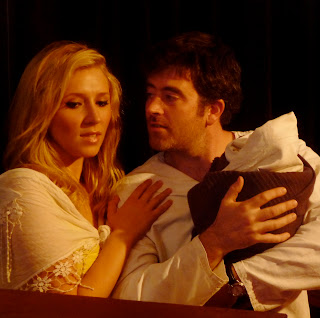Re-visiting a diary kept during one’s adolescence is inevitably a squirmy experience. In this musical adaptation of L.P. Hartley’s 1953 novel (originally workshopped by Perfect Pitch) with music by Richard Taylor and a book by David Wood (both share credit for the lyrics), Leo Colston, a tweedy, repressed bachelor in his sixties declares angrily to the crowd of Victorian ghosts who stifled his emotional development fifty years earlier in 1900, “The past is a foreign country – you do things differently there.” In response, they beg Leo to let them go from the shackles of his memory. There is a sub-aqueous quality to Michael Pavelka’s set comprising of tarnished mirrors at skewed angles and a sepia colour palette (Leo’s ‘Lincoln green’ suit is the most conspicuous flash of colour), reminiscent of a once-grand stately pile that has been neglected for years.
Warned by his widowed mother that the upper classes live very differently, twelve-year-old Leo arrives to spend the summer at the Norfolk estate of his school chum Marcus’s untitled but certainly entitled family. As one of the only children in a house full of grown ups, he is intoxicated by and becomes the protégé of Marcus’s beautiful elder sister Marian and the ‘postman’ who delivers messages between her and the ‘ladykiller’ tenant farmer Ted Burgess. If Hartley’s writing can be compared to Henry James (in style and themes, charting a child’s loss of innocence and the taboo of sexual relationships across the class divide), it seems apt that Taylor’s beautifully integrated and shimmeringly lovely score with snatches of Gothic menace has echoes of Benjamin Britten’s The Turn of the Screw (as well as Sondheim’s Passion), lavishly scored for a grand piano played onstage by Jonathan Gill. Everything is seen through Leo’s eyes in Wood’s very faithful adaptation, and so there isn’t a love duet as Leo never sees the lovers together.
Roger Haines employs gracefully choreographed movement to create images that, as befits Taylor’s musical style, aren’t quite set pieces but have the same kind of impact. Stuart Ward’s ‘wild’, sinewy Ted, upon whom Leo depends for his sentimental education, bursts in on civilised bathing party; Leo celebrates his heroism as twelfth man in the crucial cricket match between the Hall and the village (to my mind, Hartley was unique in being able to make cricket exciting) and there is an animalistic denouement enacted by phallic umbrellas. Tim Lutkin’s lighting is a key player in the storytelling, evoking the glorious sunshine and the coming storm as well as the shifts in time.
Keats’s ‘La Belle Dame Sans Merci’ is a recurring motif, tying in neatly with the deadly nightshade (belladonna). The idea of a vampiric woman who seduces men and leaves them helpless is all too clear to the audience, while Marian’s upstanding intended Hugh Trimingham (Stephen Carlile), an aristocrat disfigured in the Boer War, clings to a soon-to-be outdated chivalric code in which “Nothing is ever a lady’s fault.” Sophie Bould offers a precise soprano as Marian and the children are just precocious enough with splendid singing and acting abilities: Adam Bradbury makes a sweetly snooty Marcus and William Miles’s wide-eyed and inquisitive Leo ably anchors the show alongside the outstanding James Staddon as his damaged adult counterpart.
The Go-Between entwines adult secrets and lies with the careless cruelty and destruction wreaked by the upper classes’ inborn sense of the world revolving around them (Marcus informs Leo, “Don’t thank the servants – that’s why they’re there”); the rich symbolism of Hartley’s writing is acutely dramatised in an intelligent, heartfelt and delicately realised gem of new British musical theatre writing that very much deserves a further life beyond this world premiere tour.
Written for Exeunt
18 hours ago
























